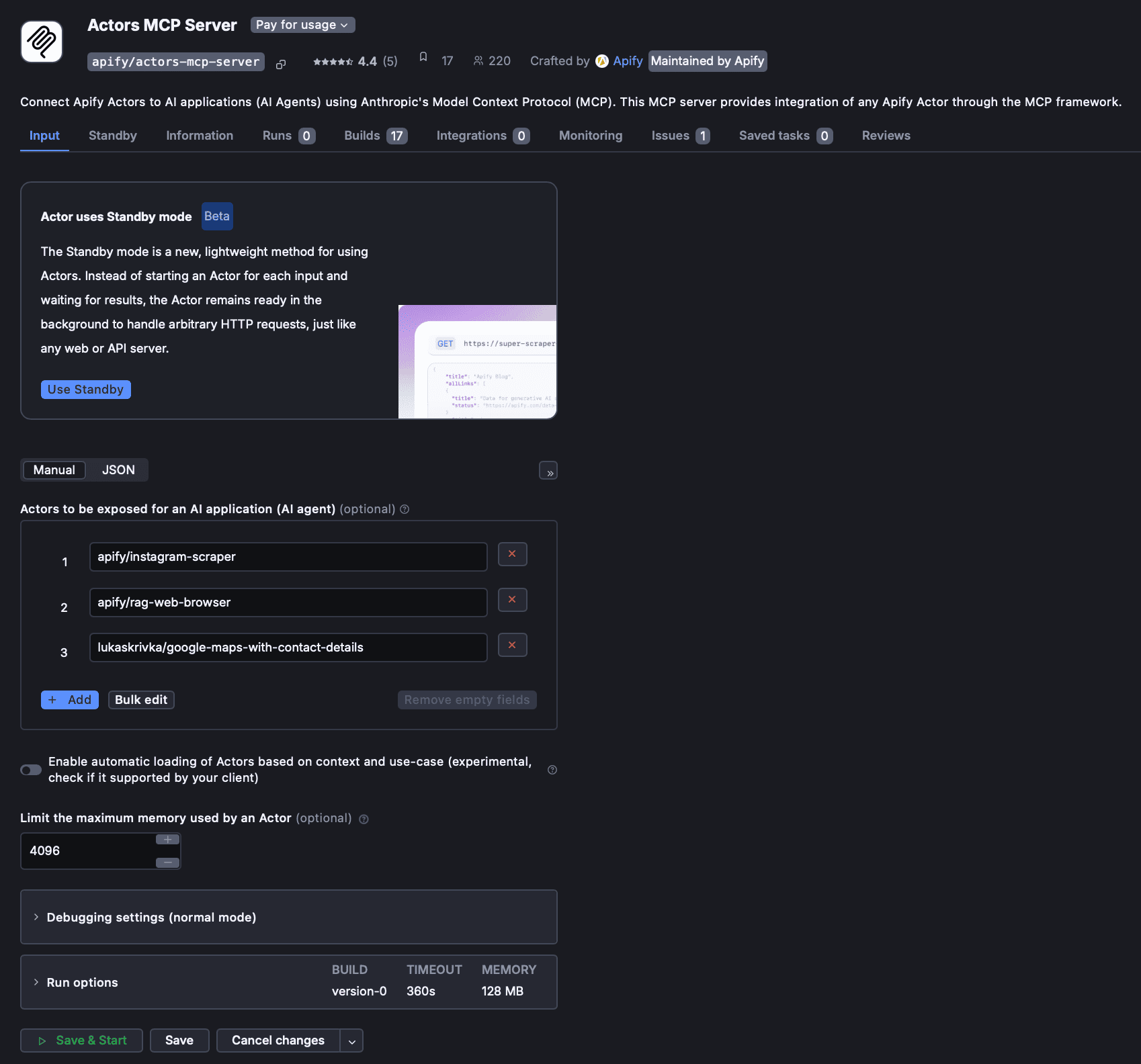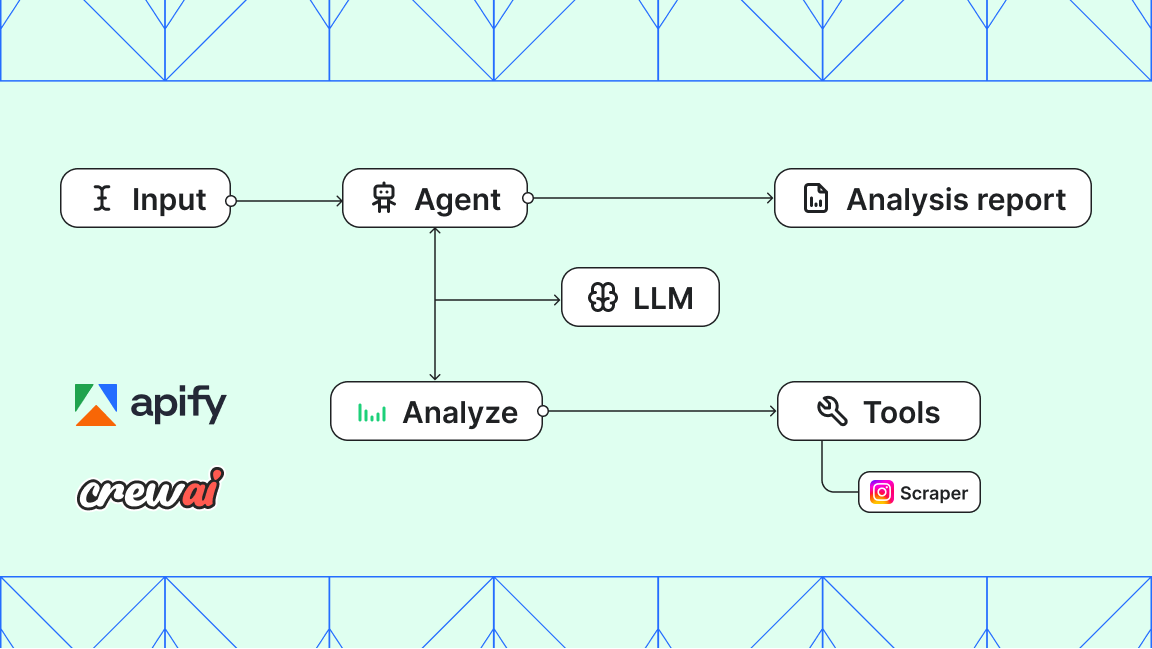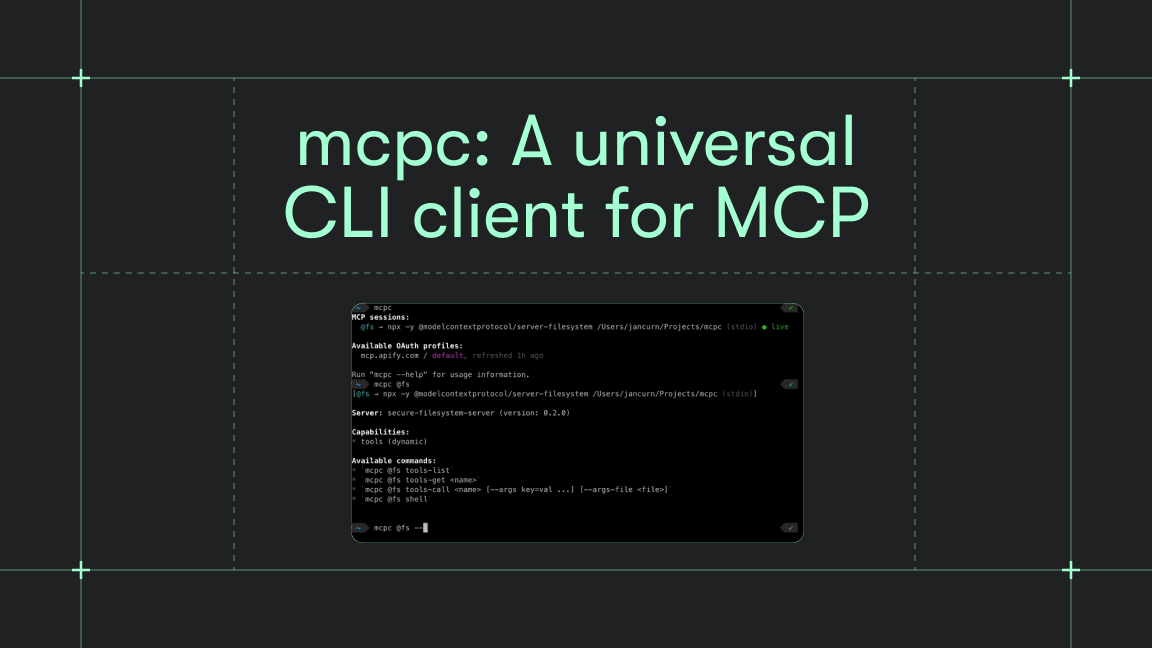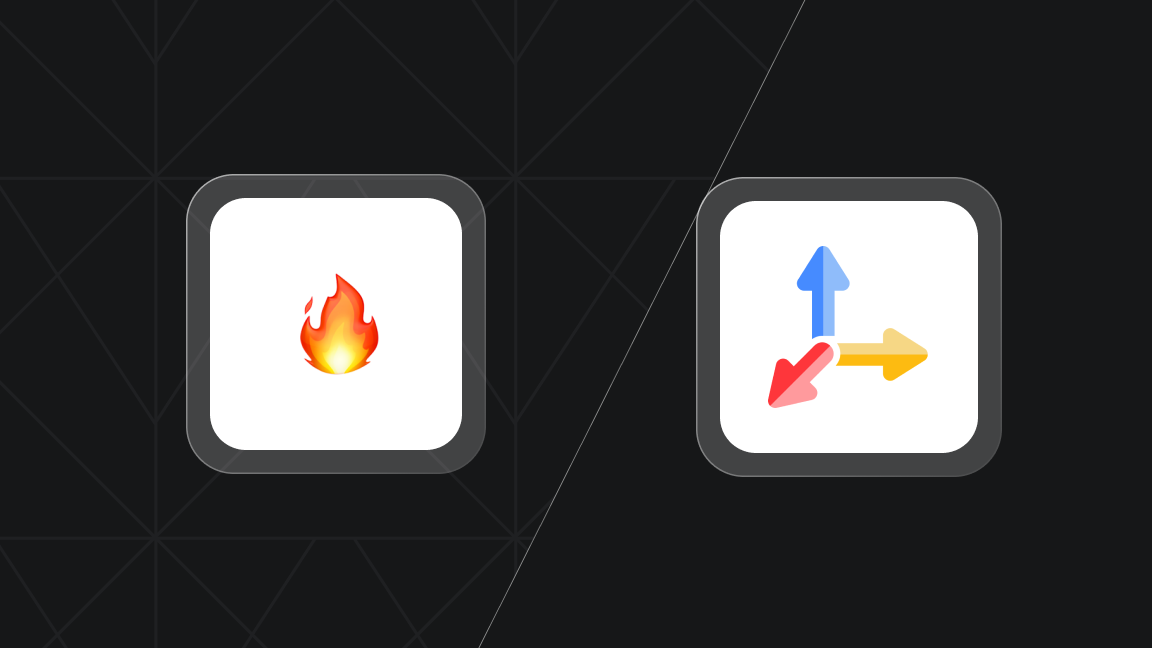When an AI agent can’t fetch fresh, structured information, its reasoning engine turns to guesswork. The most effective AI agent tools are Actors that let agents pull live web context on demand. Apify hosts thousands of such Actors; below are six field‑tested picks that your agents can discover automatically via MCP (Model Context Protocol).
Why Apify Actors are built for agents
- Designed for specific sites – Actors are scripted for the exact DOM quirks, anti‑bot defenses, and pagination patterns of the target site, so they break far less often than generic scraping APIs.
- Simple input and structured output by default – Every Actor returns uniform, typed fields (think
text,rating,price, etc.), sparing you post‑processing cycles, hallucinations, and errors. - Model Context Protocol (MCP) discovery - Apify exposes every public Actor as an MCP tool, so frameworks like LangChain, CrewAI, or Claude Desktop can auto‑catalogue and call them with one configuration.
- Scalable and chainable - For example, you can chain two Actors together (e.g., Google Search Scraper and Website Content Crawler) to perform tasks.
- Native integration with AI ecosystems - E.g., LangChain, LlamaIndex, Haystack, CrewAI, Agno, LangGraph.
Takeaway: Wire an MCP client to Apify’s Actors MCP Server once, and any GPT‑4o or Claude model instantly gains 5,000+ callable tools.
6 must‑have AI agent tools for live web data

1. Website Content Crawler
Website Content Crawler is best for: Retrieval‑Augmented Generation (RAG), custom GPT knowledge uploads, and chatbots.
- Deep‑crawls static or JS sites, strips nav/ads, and exports Markdown, plain text, or HTML.
- Handles logins, infinite scroll, sitemaps, file downloads, and proxy rotation.
- 99% success rate. 49.5k users.

2. Twitter (X.com) Scraper Unlimited
This Twitter scraper is best for: Real‑time sentiment and trend detection.
- Enterprise-grade, event‑based pricing - no global rate limits.
- Query Wizard plus advanced filters (language, geo, engagement thresholds) for precise data pulls.
- 99 % success rate. 6k users.

3. Google Maps Scraper
This Google Maps scraper is best for: Lead gen, competitive intel, local recommendations.
- Extracts phone, email, hours, reviews, images, “popular times,” and more.
- Smart zoom & polygon geofencing beats Google’s 120‑place cap and delivers city‑wide coverage.
- 98% success rate. 100.8k users.

4. Instagram Scraper
Instagram Scraper is best for: Influencer discovery, trend analysis, and mining user-generated content.
- Scrapes profiles, hashtags, places, and comments - even after Meta’s API restrictions.
- $2.30 for 1,000 results. Free tier pulls over 2,100 results per month. Lowest paid tier scales to 21,000 results.
- 99 % success rate. 93.8k users.

5. Apollo Scraper
Apollo Scraper is best for: Building prospect lists and autonomous SDR (sales development representative) agents.
- No cookies or creds - just drop an Apollo search URL.
- $1.30 for 1,000 leads. Free tier pulls 100 leads. Lowest paid tier scales to 50k.
- 97% success rate. 27.7k users.

6. Amazon Reviews Scraper
This Amazon scraper is best for: Product intelligence, VoC (Voice of the Customer) sentiment, and competitor analysis.
- Extracts full‑text reviews, ratings, images, “helpful” votes - no Amazon API key needed.
- Outputs JSON, CSV, Excel, or XML; ideal for feeding LLM sentiment or relevance models.
- 99 % success rate. 4.4k users.
You can wire any of these tools into an agent workflow by accessing the Actor using API, link, native implementation into AI frameworks, or MCP.

MCP quick‑start
Add Apify’s Actors MCP Server to any MCP‑compatible client, and every Actor above appears as a callable tool:
{
"mcpServers": {
"actors-server": {
"command": "npx",
"args": ["-y", "@apify/actors-mcp-server"],
"env": { "APIFY_TOKEN": "your-token" }
}
}
}
From there, an agent can self‑select, for example, apify/website-content-crawler when the user asks for “summaries of Stripe’s developer docs.”
For a more detailed tutorial, check out our guide to using MCP with Apify Actors.
Coda: No more hallucinations
In 2025, the AI agent tools that matter most are the ones that ground conversation, tools that answer, “What’s happening right now?” Apify’s Actors give autonomous systems the ability to query the live web at production scale, while MCP turns those Actors into first‑class LLM functions. Plug any of the six above into your agent stack and get fresh, reliable responses instead of hallucinations.
More about AI agents
- What are AI agents? - The Apify platform is turning the potential of AI agents into practical solutions.
- 5 open-source AI agents on Apify that save you time - These AI agents are practical tools you can test and use today, or build on if you're creating your own automation.
- How to build an AI agent - A complete step-by-step guide to creating, publishing, and monetizing AI agents on the Apify platform.
- AI agent orchestration with OpenAI Agents SDK - Learn to build an effective multiagent system with AI agent orchestration.
- AI agent workflow - building an agent to query Apify datasets - Learn how to extract insights from datasets using simple natural language queries without deep SQL knowledge or external data exports.
- How to use MCP with Apify Actors - Learn how to expose over 5,000 Apify Actors to AI agents like Claude and LangGraph, and configure MCP clients and servers.
- 11 AI agent use cases (on Apify) - 10 practical applications for AI agents, plus one meta-use case that hints at the future of agentic systems.
- The state of MCP - The latest developments in Model Context Protocol and solutions to key industry challenges.
- 10 best AI agent frameworks - 5 paid platforms and 5 open-source options for building AI agents.
- Best low-code and no-code AI agent builders in 2025 - If frameworks like LangGraph or Haystack are too challenging for you, these AI agent builders might be what you're looking for.
- AI agent architecture in 1,000 words - A comprehensive overview of AI agents' core components and architectural types.
- 7 real-world AI agent examples in 2025 you need to know - From goal-based assistants to learning-driven systems, these agents are powering everything from self-driving cars to advanced web automation.
- LLM agents: all you need to know in 2025 - LLM agents are changing how we approach AI by enabling interaction with external sources and reasoning through complex tasks.
- 7 types of AI agents you should know about - What defines an AI agent? We go through the agent spectrum, from simple reflexive systems to adaptive multi-agent networks.
- AI agent vs. chatbot - We break down the differences between agents and chatbots to help you decide which one to use for your business goals.








